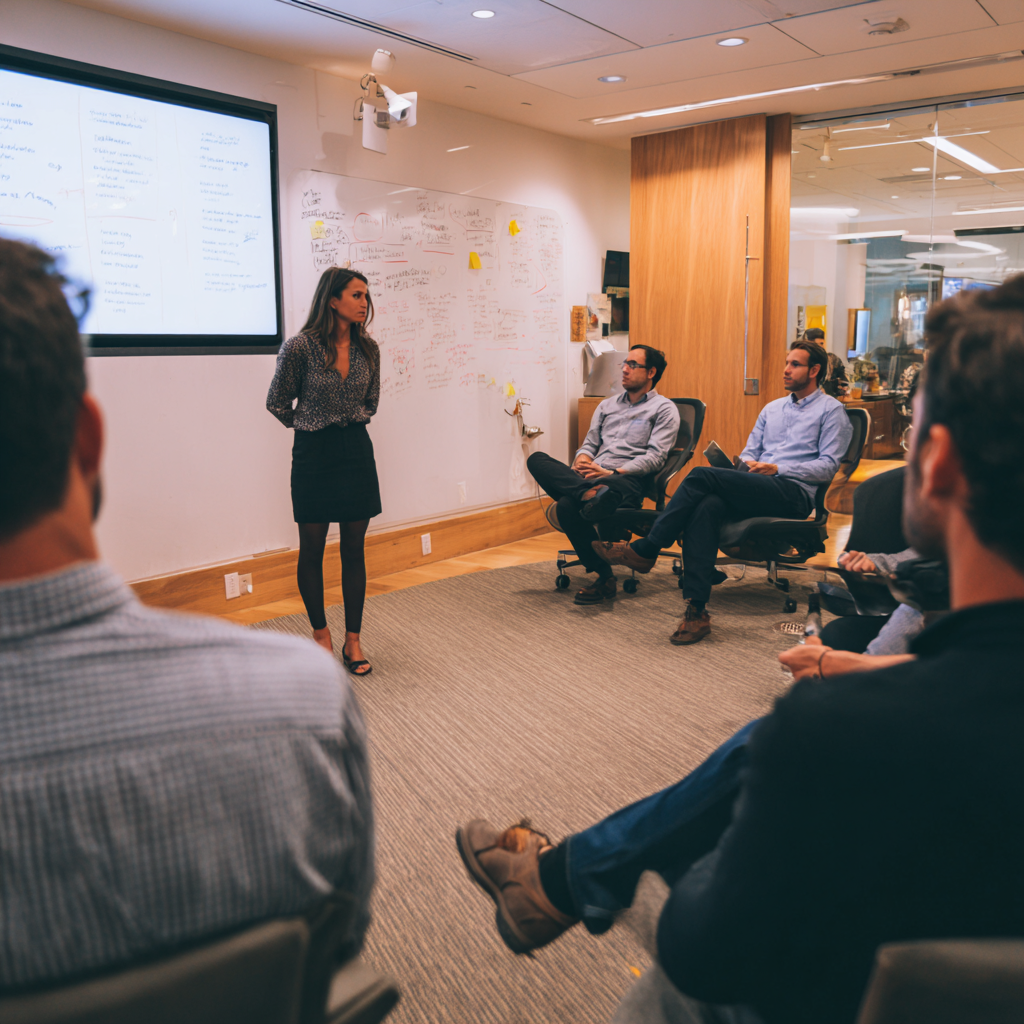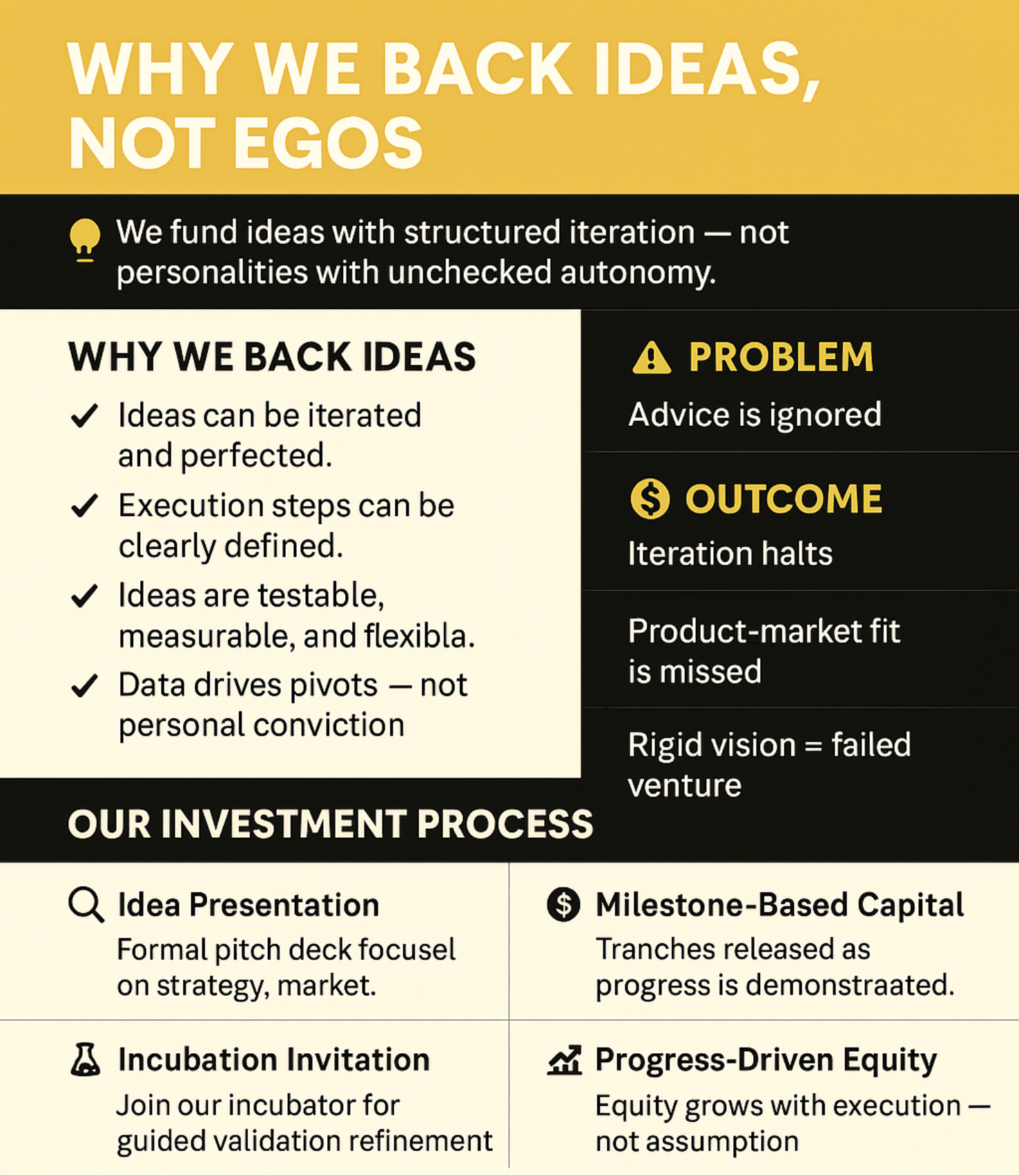Backing Ideas, Not Egos: Why Our Venture Philosophy Prioritizes Vision Over Founder Mythology

In venture capital, it’s become common wisdom that the team matters more than the idea. We hear it everywhere—“bet on the jockey, not the horse.” But after years in this space, I’ve found that logic flawed. In our practice, we do the opposite: we back the idea first, and we structure our investments accordingly.
Here’s why.
Ideas Are Fluid. People Are Not.
Ideas can evolve. They can be tested, broken apart, rebuilt, and optimized. With the right framework, almost any venture can be iterated into something viable—or even great. When we fund ideas, we treat them as hypotheses. We pressure-test them against the market, provide targeted support, and track progress through milestone-based evaluation. The most important thing isn’t who’s holding the pitch deck—it’s whether the idea can withstand disciplined scrutiny and systematic iteration.
Founders, on the other hand, are often locked into their own convictions. That conviction is often what got them in the room—but it can quickly become the thing that closes the door to further progress. Once capital is wired, some founders interpret it not as an investment in collaborative growth, but as a validation of their personal vision. They begin to resist feedback, view structured guidance as interference, and in many cases, conflate our money with a blank check to build their way, no matter how flawed.
This isn’t about founder-bashing. We’ve worked with many who are brilliant, collaborative, and adaptive. But structurally, the cult of the founder has created a system where venture capital is too often used to reinforce egos, not build companies.
Capital Should Be Conditional, Not Unconditional
When we invest, we do it based on formal presentations of ideas—not personality-driven pitches. We evaluate market opportunity, competitive differentiation, and the feasibility of an execution roadmap. Once we’re aligned, we structure milestone-based tranches: initial funding covers validation work, customer interviews, and MVP construction. Further capital depends on meeting specific deliverables.
This isn’t us being controlling. It’s how we safeguard both the capital and the venture. By funding the idea instead of the person, we’re creating a disciplined process. It rewards learning and iteration—not charisma or salesmanship.
Founders who come through our doors understand upfront that we don’t offer blank checks. What we offer instead is structured partnership: access to funding, strategic guidance, and our in-house incubator, where domain-specific experts help shape the venture toward product-market fit. If a founder can’t separate their ego from their execution, we’re not the right partner—and that’s intentional.
The “Founder Knows Best” Model Is Overrated
There’s a dangerous narrative in the startup ecosystem: that the best founders are visionaries who defy conventional wisdom and stick to their guns. This idea has roots in the mythology of Jobs, Musk, and Zuckerberg—but it’s survivorship bias at its worst.
For every success story of a founder who “ignored the haters,” there are thousands of failed ventures that flamed out because the founder refused to pivot, change assumptions, or adapt to feedback. Yet we rarely study those. Instead, we keep doubling down on the myth that the founder’s instincts are sacred.
In our experience, the most successful ventures are not the ones that were perfectly envisioned from day one. They are the ones that learned. That adapted. That treated early capital as a chance to experiment, not a license to entrench.
Incubation > Idolatry
Our model replaces traditional founder idolatry with operational partnership. Once we greenlight an idea, we invite its proposer into our incubator—not to glorify their vision, but to pressure test it. Inside our incubator, founders work shoulder-to-shoulder with product experts, business model designers, and go-to-market strategists. They receive data, mentorship, and deadlines—not just encouragement.
The goal isn’t to break their spirit. It’s to separate great ideas from the noise. In many cases, founders emerge stronger. They learn to listen. They discover that iteration is not a betrayal of vision—it’s the process through which vision becomes reality.
But if a founder treats our capital as a reward for being right rather than a challenge to become right, we’re quick to part ways.

The Real Product Is Process
At our firm, we believe the real product of early-stage investing isn’t the company or the founder—it’s the process. The process through which ideas evolve into products, and products evolve into businesses. We don’t fund static ideas or romantic notions of entrepreneurship. We fund ideas that come with a willingness to be challenged, revised, and stress-tested.
That’s why we’re unapologetic about our filters. Our deal flow focuses on teams who present compelling ideas with clear willingness to iterate. We’re transparent about the fact that funding is milestone-based. Founders can earn equity and autonomy over time, but it’s not granted based on a 10-minute pitch deck. It’s built through the work.
Summary: What We Believe
If you’re a founder wondering what kind of investor we are, here’s our stance in plain terms:
- We fund ideas, not personalities.
- We structure milestone-based payouts, not lump-sum wire transfers.
- We provide incubation, not affirmation.
- We value humility, adaptability, and process over sheer vision.
- And we view capital as fuel for disciplined experimentation, not a badge of validation.

The startup world has spent a decade glorifying founders. We think it’s time to glorify process, insight, and execution instead.
If you have an idea worth testing—and the discipline to evolve it—we’d love to talk.